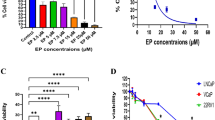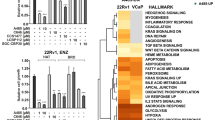Abstract
Previous studies using immunohistochemistry suggest that loss of the expression of the prostate-derived Ets transcription factor (PDEF) is a strong indicator for cancer cell malignancy. However, the underlying mechanism for this has not been well elucidated. We determined the role of PDEF in breast cancer cell growth and tumor formation using a series of experiments including Western blotting, promoter-luciferase reporter assay, RNA interference technology and a mouse xenograft model. We also determined the relationship between PDEF expression in human breast tumor specimen and cancer patient survivability. These studies revealed that PDEF expression is inversely associated with survivin expression and breast cancer cell xenograft tumor formation. PDEF-specific shRNA-mediated silencing of PDEF expression resulted in the upregulation of survivin expression in MCF-7 cells, which was associated with increased cell growth and resistance to drug-induced DNA fragmentation (apoptosis). In contrast, survivin-specific siRNA-mediated silencing of survivin expression decreased MCF-7 cell growth. Ectopic expression of PDEF inhibited both survivin promoter activity and endogenous survivin expression. Importantly, shRNA-mediated silencing of PDEF expression in MCF-7 breast cancer cells enhanced survivin expression and xenograft tumor formation in vivo. Furthermore, loss of PDEF expression in breast cancer tissues tends to be associated with unfavorable prognosis. These studies provide new information for the role of PDEF and survivin in breast cancer cell growth and tumor formation.
Similar content being viewed by others
Abbreviations
- PDEF/hPSE:
-
Prostate derived Ets transcription factor/human prostate-specific Ets
- IAP:
-
Inhibitor of apoptosis
- SCID:
-
Severe combined immunodeficiency
- ShRNA:
-
Small hairpin RNA
- GAPDH:
-
Glyceraldehydes 3-phosphate dehydrogenase
- RT-PCR:
-
Reverse transcription-mediated polymerase chain reaction
- SD:
-
Standard deviation
References
Nozawa M, Yomogida K, Kanno N, Nonomura N, Miki T, Okuyama A, Nishimune Y, Nozaki M (2000) Prostate-specific transcription factor hPSE is translated only in normal prostate epithelial cells. Cancer Res 60(5):1348–1352
Tsujimoto Y, Nonomura N, Takayama H, Yomogida K, Nozawa M, Nishimura K, Okuyama A, Nozaki M, Aozasa K (2002) Utility of immunohistochemical detection of prostate-specific Ets for the diagnosis of benign and malignant prostatic epithelial lesions. Int J Urol 9(3):167–172
Feldman RJ, Sementchenko VI, Gayed M, Fraig MM, Watson DK (2003) Pdef expression in human breast cancer is correlated with invasive potential and altered gene expression. Cancer Res 63(15):4626–4631
Li F (2005) Role of survivin and its splice variants in tumorigenesis. Br J Cancer 92(2):212–216
Li F (2003) Survivin Study: what is the next wave? J Cell Physiol 197(1):8–29
Li F, Ling X (2006) Survivin Study: An update of “What is the next wave?” J Cell Physiol 208(3):476--486
Ling X, Bernacki RJ, Brattain MG, Li F (2004) Induction of survivin expression by taxol (paclitaxel) is an early event which is independent on taxol-mediated G2/M arrest. J Biol Chem 279(15):15196–15203
Ling X, Yang J, Tan D, Ramnath N, Younis T, Bundy BN, Slocum HK, Yang L, Zhou M, Li F (2005) Differential␣expression of survivin-2B and survivin-DeltaEx3 is inversely associated with disease relapse and patient survival␣in non-small-cell lung cancer (NSCLC). Lung Cancer 49:353–361
Ghadersohi A, Sood AK (2001) Prostate epithelium-derived Ets transcription factor mRNA is overexpressed in human breast tumors and is a candidate breast tumor marker and a breast tumor antigen. Clin Cancer Res 7(9):2731–2738
Ling X, Li F (2004) Silencing of antiapoptotic survivin gene by multiple approaches of RNA interference technology. BioTechniques 36(3):450–454, 456–460
Oettgen P, Finger E, Sun Z, Akbarali Y, Thamrongsak U, Boltax J, Grall F, Dube A, Weiss A, Brown L et al (2000) PDEF, a novel prostate epithelium-specific ets transcription factor, interacts with the androgen receptor and activates prostate-specific antigen gene expression. J Biol Chem 275(2):1216–1225
Li F, Altieri DC (1999) Transcriptional analysis of human survivin gene expression. Biochem J 344(Pt 2):305–311
Wu J, Ling X, Pan D, Apontes P, Song L, Liang P, Altieri DC, Beerman T, Li F (2005) Molecular mechanism of inhibition of survivin transcription by the GC-rich sequence selective DNA-binding antitumor agent, hedamycin: evidence of survivin downregulation associated with drug sensitivity. J Biol Chem 280(10):9745–9751
Mantel N (1966) Evaluation of survival data and two new rank order statistics arising in its consideration. Cancer Chemother Rep 50(3):163–170
Peto R, Pike MC, Armitage P, Breslow NE, Cox DR, Howard SV, Mantel N, McPherson K, Peto J, Smith PG (1977) Design and analysis of randomized clinical trials requiring prolonged observation of each patient. II. analysis and examples. Br J Cancer 35(1):1–39
Lee-Huang S, Huang PL, Sun Y, Chen HC, Kung HF, Murphy WJ (2000) Inhibition of MDA-MB-231 human breast tumor xenografts and HER2 expression by anti-tumor agents GAP31 and MAP30. Anticancer Res 20(2A):653–659
Sementchenko VI, Watson DK (2000) Ets target genes: past, present and future. Oncogene 19(55):6533–6548
Feldman RJ, Sementchenko VI, Watson DK (2003) The epithelial-specific Ets factors occupy a unique position in defining epithelial proliferation, differentiation and carcinogenesis. Anticancer Res 23(3A):2125–2131
Yamada N, Tamai Y, Miyamoto H, Nozaki M (2000) Cloning and expression of the mouse Pse gene encoding a novel Ets family member. Gene 241(2):267–274
Gunawardane RN, Sgroi DC, Wrobel CN, Koh E, Daley GQ, Brugge JS (2005) Novel role for PDEF in epithelial cell migration and invasion. Cancer Res 65(24):11572–11580
O’Connor DS, Wall NR, Porter AC, Altieri DC (2002) A p34(cdc2) survival checkpoint in cancer. Cancer Cell 2(1):43–54
Wall NR, O’Connor DS, Plescia J, Pommier Y, Altieri DC (2003) Suppression of survivin phosphorylation on Thr34 by flavopiridol enhances tumor cell apoptosis. Cancer Res 63(1):230–235
Ghadersohi A, Odunsi K, Lele S, Collins Y, Greco WR, Winston J, Liang P, Sood AK (2004) Prostate derived Ets transcription factor shows better tumor-association than other cancer-associated molecules. Oncol Rep 11(2):453–458
Galang CK, Muller WJ, Foos G, Oshima RG, Hauser CA (2004) Changes in the expression of many Ets family transcription factors and of potential target genes in normal mammary tissue and tumors. J Biol Chem 279(12):11281–11292
Thompson HG, Harris JW, Wold BJ, Lin F, Brody JP (2003) p62 overexpression in breast tumors and regulation by prostate-derived Ets factor in breast cancer cells. Oncogene 22(15):2322–2333
Acknowledgements
We would like to thank Dr. Brian Bundy for helping with the statistical analyses of the experimental data in this study, Dr. Stephen Edge for clinical information and Dr. Ashwani Sood for his generous helping in the study. This work was sponsored in part by NIH R01 Grants (CA109481), The Susan G. Komen Breast Cancer Foundation (BCTR63806) and Grants from Concern Foundation (Beverly Hill, CA) to FL, and shared resources of an NCI Comprehensive Cancer Center Support Grant (CA16056) to Roswell Park Cancer Institute.
Author information
Authors and Affiliations
Corresponding author
Rights and permissions
About this article
Cite this article
Ghadersohi, A., Pan, D., Fayazi, Z. et al. Prostate-derived Ets transcription factor (PDEF) downregulates survivin expression and inhibits breast cancer cell growth in vitro and xenograft tumor formation in vivo. Breast Cancer Res Treat 102, 19–30 (2007). https://doi.org/10.1007/s10549-006-9314-9
Received:
Accepted:
Published:
Issue Date:
DOI: https://doi.org/10.1007/s10549-006-9314-9




